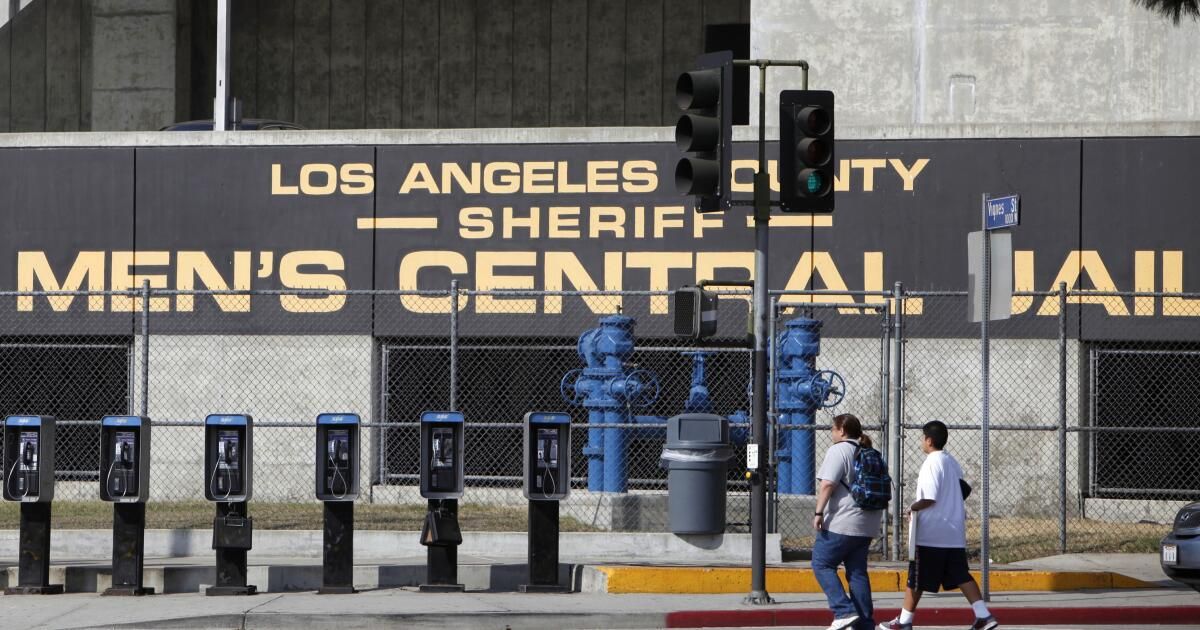Mentally ill people under guardianship are being held in Los Angeles County jails even after their criminal charges are dropped, according to a report released Tuesday by Disability Rights California.
Similarly, they remain months in county psychiatric hospitals after doctors have agreed it is safe for them to leave, according to the report.
The issue is partly one of capacity. The facilities they could be sent to after being released from jail or hospitals are often full and have months-long waiting lists.
But Disability Rights California, a nonprofit that advocates for people with disabilities, criticized Los Angeles County for transferring them only to closed facilities, when they could be treated safely in non-closed community settings, such as group homes or housing. support.
In recent years, the county Board of Supervisors approved nearly $400 million for more closed facilities but failed to adequately fund less restrictive community housing, according to the report.
The report examined a subset of inmates under guardianship, those whose care is supervised by the Los Angeles County Public Guardian's Office because no friend or family member can take on the task. The people in the report, which also include those in locked healthcare facilities such as psychiatric hospitals, have been assessed by doctors or correctional staff as not dangerous and capable of leaving.
A person is placed under guardianship when a judge determines that they cannot care for themselves and appoints a third party to be responsible for them.
According to the report, many mentally ill wards remained in jails for months after charges were dropped.
Some were placed under guardianship after being declared incompetent to stand trial and were still not well enough to stand trial after two years of treatment.
In December, the Los Angeles County Sheriff's Department, which runs the jails, adopted a policy that ended its practice of keeping people in custody after their criminal case has been resolved, according to the report. But in February, the report said, nearly 130 of those people were still waiting to be transferred from a jail to a mental health facility.
According to the report, this is “flatly illegal” under a state law that requires guardians to place people “in the least restrictive alternative placement.”
Los Angeles County is also violating the federal Americans with Disabilities Act when it keeps mentally ill people in closed hospitals for months beyond what their doctors consider medically necessary, according to the report.
The U.S. Supreme Court has ruled that a lack of beds is not a defense to confining people to hospitals.
The county Department of Mental Health said in a statement that it is committed to providing healing and recovery to people with serious mental illnesses, including those whose guardianships are supervised by the county.
“Whenever possible, our goal is to place and treat clients in the least restrictive setting available in accordance with the California Welfare and Institutions Code and support our clients' journey toward wellness, self-sufficiency, and membership in a community.” community,” the statement said. . “We are taking the allegations laid out in the Disability Rights California report seriously, will examine its findings, and are always exploring ways to ensure clients are placed in the least restrictive settings most appropriate to meet their needs.”
At the county's inpatient psychiatric hospitals, people under guardianship remain “for months or years after they are ready for release,” while the county waits for a locked bed in a “less restrictive” environment, the report said. .
When asked how many of the patients were ready to be discharged, county staff responded, “All of them,” according to the report. Two patients had been in the acute inpatient psychiatric unit at Los Angeles County General Hospital for 423 days and 593 days, according to the report.
The report also highlighted the cost of keeping people with mental illness locked up: $19,760 per person per month in the county jail's mental health unit and $46,600 per month in the county's inpatient psychiatric unit, according to the report.
The Office of the Public Guardian, part of the county's mental health department, oversees the care of about half, or 2,300, of people under mental health guardianship, including those who are not in jail.
According to a joint January report by county Mental Health Director Lisa H. Wong and Health Services Director Dr. Christina R. Ghaly, county mental health court judges have imposed “an incredible number ” of court-ordered sanctions, including daily fines, to the public guardian's office for failing to place wards in treatment in a timely manner.
In response, the county began moving some wards to mental health urgent care facilities after they were cleared from jail. But the centers are designed for outpatient care and short stays, according to the county report.












